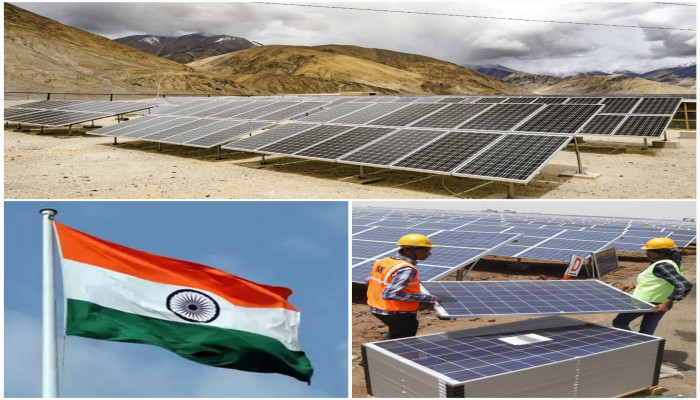India reaches 100 GW solar power milestone: Pralhad Joshi
- In Reports
- 06:19 PM, Feb 07, 2025
- Myind Staff
The government announced on Friday that India has reached a significant milestone in pursuing a cleaner and more sustainable future by reaching 100 GW of installed solar power capacity, reaffirming its status as a global leader in renewable energy.
As of January 31, the country’s total installed solar capacity has reached 100.33 GW, with an additional 84.10 GW currently under development and another 47.49 GW in the tendering process.
This achievement represents a prominent step toward India’s goal of achieving 500 GW of non-fossil fuel energy capacity by 2030, a target set by Prime Minister Narendra Modi.
Pralhad Joshi, the Union Minister of New and Renewable Energy, stated, “India’s energy journey over the past 10 years has been historic and inspiring. Initiatives like solar panels, solar parks, and rooftop solar projects have brought about revolutionary changes”.
“As a result, today, India has successfully achieved the target of 100 GW of solar energy production. In the field of green energy, India is not only becoming self-reliant but is also showing the world a new path,” highlighted the minister.
The PM Surya Ghar Muft Bijli Yojana is transforming rooftop solar adoption across India, making clean energy accessible to households and driving a significant shift toward sustainability. This initiative is proving to be a game-changer by enabling homes to generate their own electricity through solar power.
Launched in 2024, the scheme has already facilitated nearly 9 lakh rooftop solar installations, allowing families nationwide to embrace renewable energy solutions.
India’s solar sector has experienced an astonishing 3,450% growth over the past decade, with capacity soaring from 2.82 GW in 2014 to 100 GW in 2025. This rapid expansion underscores the nation’s commitment to clean energy.
In addition to rooftop solar, India is making significant strides in hybrid and round-the-clock (RTC) renewable energy projects. Currently, 64.67 GW of such projects are either under implementation or have been tendered, contributing to a total solar and hybrid project capacity of 296.59 GW.
Solar power remains the leading force behind India’s renewable energy expansion, making up 47% of the country’s total installed renewable capacity. This highlights its critical role in achieving India's green energy goals.
The minister stated that in 2024, India achieved a record-breaking addition of 24.5 GW in solar capacity, doubling the installations from 2023.
The year also saw a remarkable expansion in utility-scale solar projects, with 18.5 GW of capacity installed—an increase of nearly 2.8 times compared to the previous year. States like Rajasthan, Gujarat, Tamil Nadu, Maharashtra and Madhya Pradesh played a crucial role in this growth, significantly contributing to the country's overall utility-scale solar capacity.
The rooftop solar sector also experienced impressive progress, with 4.59 GW of new installations in 2024, marking a 53% rise compared to 2023.
India has also made significant advancements in solar manufacturing. 2014, the country’s solar module production capacity was just 2 GW. However, over the past ten years, this has skyrocketed to 60 GW by 2024, positioning India as a key player in the global solar manufacturing industry.
“With continued policy support, India is on track to achieve a solar module production capacity of 100 GW by 2030,” said Pralhad Joshi.







Comments